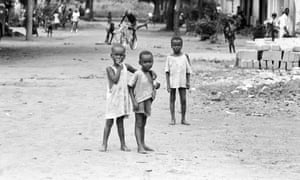
Robert Bennett says no account of the war should ignore its origins in a mainly Igbo military coup in 1966. Alan Healey thinks too many people still look at Britain’s colonial past as a golden age. Judith Nicoll recalls her father, who was shot down and killed while flying food and medicines into Biafra
Frederick Forsyth (Buried for 50 years: Britain’s shameful role in Biafra, Journal, 21 January) arrived in Biafra shortly after I was evacuated in June 1967 at the start of the war, just 15 miles north of Nsukka, where I was working as a university lecturer.
No account of the Biafran war should ignore its origins in a mainly Igbo military coup in January 1966, a coup in which three Nigerian political leaders were assassinated (none of them Igbo). Among them was a man who, by popular accounts, was a modest and good politician: the prime minister, Tafawa Balewa.
The military justified their actions with widespread corruption in government. The eventual consequences were the attempted secession of Biafra from Nigeria and the dreadful war of attrition, with the British duplicity that Forsyth describes. And the children, are they not the first casualty of war? One very great sadness for me is that a dear colleague, a truly gentle man, was shot by the Biafran military because of his advocacy for the independent Nigeria (only gained from Britain in 1960). He believed in his non-Igbo language area of Biafra.Robert BennettLeicester
• Frederick Forsyth paints a depressing picture of Britain’s role in Biafra, but his picture is rather too narrow. At the beginning of his piece he says that most of the time he is proud of his country, while mentioning a small number of other incidents that bring shame upon Britain. In fact, our whole colonial history, along with that of several other European countries, is a source of shame. While we can point to considerable incidental benefits from our colonial past – Indian railways are often cited – those benefits were almost always for our own benefit and none excused the gross exploitation of peoples and raw materials that made us rich. Too many people still look at our past as a golden age. It wasn’t.
Alan Healey
Baschurch, Shropshire
Alan Healey
Baschurch, Shropshire
• My father, an ex-RAF bomber pilot, flew for Joint Church Aid, carrying food and medicines into Biafra. He flew night flights from São Tomé to avoid the Nigerian MiG fighters and was shot down and killed by a German mercenary in September 1969 while trying to land at Uli airport. I understand several other people died with him. He is buried by the side of Uli airport. Frederick Forsyth had met my father and kindly wrote a long letter to my mother offering his sympathy for her loss. I believe he was the only British pilot out there.
Judith Nicoll
East Lydford, Somerset
Judith Nicoll
East Lydford, Somerset
• Join the debate – email guardian.letters@theguardian.com
• Read more Guardian letters – click here to visit gu.com/letters
• Do you have a photo you’d like to share with Guardian readers? Click here to upload it and we’ll publish the best submissions in the letters spread of our print edition
As 2020 begins…
… we’re asking readers, like you, to make a new year contribution in support of the Guardian’s open, independent journalism. This has been a turbulent decade across the world – protest, populism, mass migration and the escalating climate crisis. The Guardian has been in every corner of the globe, reporting with tenacity, rigour and authority on the most critical events of our lifetimes. At a time when factual information is both scarcer and more essential than ever, we believe that each of us deserves access to accurate reporting with integrity at its heart.
More people than ever before are reading and supporting our journalism, in more than 180 countries around the world. And this is only possible because we made a different choice: to keep our reporting open for all, regardless of where they live or what they can afford to pay.
We have upheld our editorial independence in the face of the disintegration of traditional media – with social platforms giving rise to misinformation, the seemingly unstoppable rise of big tech and independent voices being squashed by commercial ownership. The Guardian’s independence means we can set our own agenda and voice our own opinions. Our journalism is free from commercial and political bias – never influenced by billionaire owners or shareholders. This makes us different. It means we can challenge the powerful without fear and give a voice to those less heard.
None of this would have been attainable without our readers’ generosity – your financial support has meant we can keep investigating, disentangling and interrogating. It has protected our independence, which has never been so critical. We are so grateful.
As we enter a new decade, we need your support so we can keep delivering quality journalism that’s open and independent. And that is here for the long term. Every reader contribution, however big or small, is so valuable.
Comments
Post a Comment
https://saviournicodemus.blogspot.com